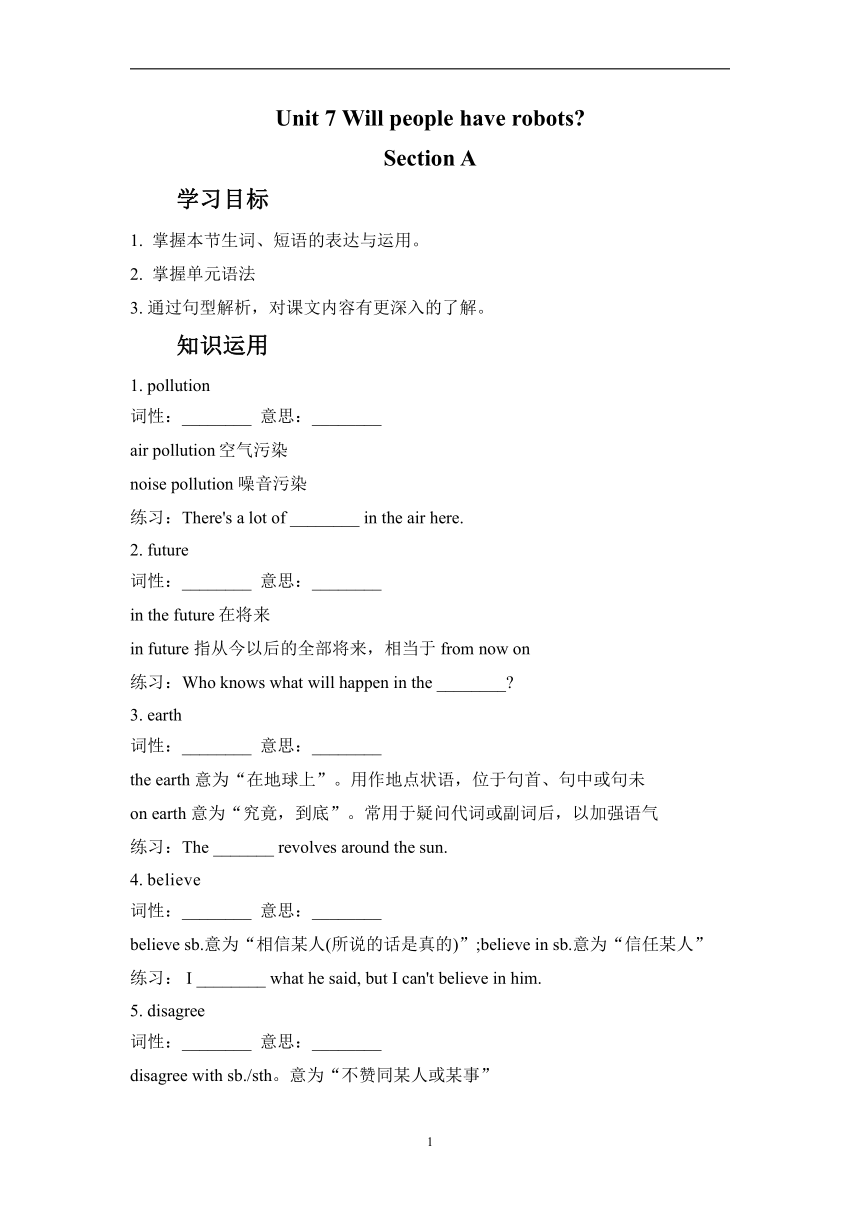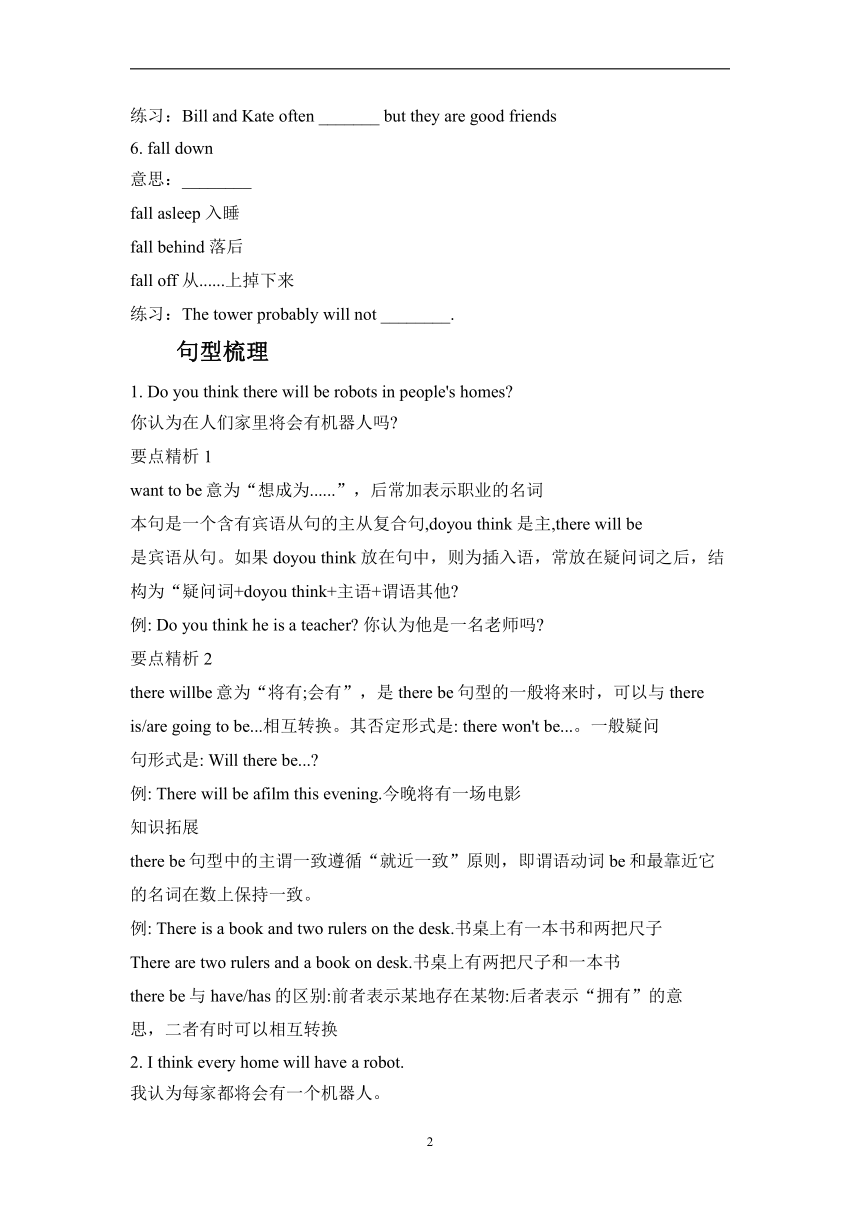Unit 7 Will people have robots Section A 学案-初中英语人教版八年级上册(含答案)
文档属性
| 名称 | Unit 7 Will people have robots Section A 学案-初中英语人教版八年级上册(含答案) |

|
|
| 格式 | docx | ||
| 文件大小 | 28.4KB | ||
| 资源类型 | 教案 | ||
| 版本资源 | 人教新目标(Go for it)版 | ||
| 科目 | 英语 | ||
| 更新时间 | 2023-11-23 11:34:54 | ||
图片预览



文档简介
Unit 7 Will people have robots
Section A
学习目标
掌握本节生词、短语的表达与运用。
掌握单元语法
3. 通过句型解析,对课文内容有更深入的了解。
知识运用
1. pollution
词性:________ 意思:________
air pollution空气污染
noise pollution 噪音污染
练习:There's a lot of ________ in the air here.
2. future
词性:________ 意思:________
in the future在将来
in future 指从今以后的全部将来,相当于 from now on
练习:Who knows what will happen in the ________
3. earth
词性:________ 意思:________
the earth 意为“在地球上”。用作地点状语,位于句首、句中或句未
on earth 意为“究竟,到底”。常用于疑问代词或副词后,以加强语气
练习:The _______ revolves around the sun.
4. believe
词性:________ 意思:________
believe sb.意为“相信某人(所说的话是真的)”;believe in sb.意为“信任某人”
练习: I ________ what he said, but I can't believe in him.
5. disagree
词性:________ 意思:________
disagree with sb./sth。意为“不赞同某人或某事”
练习:Bill and Kate often _______ but they are good friends
6. fall down
意思:________
fall asleep 入睡
fall behind 落后
fall off 从......上掉下来
练习:The tower probably will not ________.
句型梳理
1. Do you think there will be robots in people's homes
你认为在人们家里将会有机器人吗
要点精析 1
want to be意为“想成为......”,后常加表示职业的名词
本句是一个含有宾语从句的主从复合句,doyou think 是主,there will be
是宾语从句。如果 doyou think 放在句中,则为插入语,常放在疑问词之后,结构为“疑问词+doyou think+主语+谓语其他
例: Do you think he is a teacher 你认为他是一名老师吗
要点精析 2
there willbe意为“将有;会有”,是there be句型的一般将来时,可以与there
is/are going to be...相互转换。其否定形式是: there won't be...。一般疑问
句形式是: Will there be...
例: There will be afilm this evening.今晚将有一场电影
知识拓展
there be句型中的主谓一致遵循“就近一致”原则,即谓语动词 be和最靠近它
的名词在数上保持一致。
例: There is a book and two rulers on the desk.书桌上有一本书和两把尺子
There are two rulers and a book on desk.书桌上有两把尺子和一本书
there be与have/has的区别:前者表示某地存在某物:后者表示“拥有”的意
思,二者有时可以相互转换
2. I think every home will have a robot.
我认为每家都将会有一个机器人。
要点精析 1
这是一个含有宾语从句的主从复合句, Ithink为主句,every home will havea
robot是宾语从句,用来表述自己的看法
例: I think the boy will buy a few new books about English.
我认为这个男孩儿将会买一些英语方面的新书
知识拓展
在英语中,I think/ suppose/believe 后的宾语从句,如果是否定句,要把否定转
移到主句的动词上,这种现象称为“否定转移”
例:I don't think he can swim.我认为他不会游。
3.Will people use money in100 years 100 年后人们还会使用钱吗
要点精析
in100years意为“在100年以后”,其中in 为介词,其后跟一段时间表示“在......之后”,通常用于一般将来时,对其提问需用 how soon (多久)。
例:-How soon will your mother finish cooking dinner
你母亲多久会做好饭
-In an hour一小时后
语法讲解
一般将来时
1概念
般将来时表示将来某个时间要发生的动作或存在的状态,也表示将来经常或反复发生的动作,常与表示将来的时间状语连用,如:tomorrow,next week,next year,in the future 等
例:I will go back to my hometown next week.下周我将返回家乡
We will come to see you every Sunday.我们将在每个周日来看望你
2句式结构
(1)肯定句:主语+ will/shall// be going to+动词原形+其他
will 用于各种人称,shall用于第一人称,be 随人称、数和时态的变化而变化,will在人称代词后常简略为"。
例: They'll have a test next week.他们下周将进行测验
We will/shall visit the Summer Palace.我们将游览颐和园
I'm going to write a letter to my friend.我将给我的朋友写一封信
(2)否定句: 在 will/shall//be 后加 not。
例: The girls won't play tennis this afternoon.
这些女孩儿们今天下午不打网球。
He isn't going to join the club.他将不参加俱乐部了
(3)一般疑问句:将will/shall/be 提到主语前面
例:Will the students watch the match 学生们将去看比赛吗
Shall we go to the z00 tomorrow 明天我们去动物园吗
No,we shan't.不,我们不去
Are you going to visit your friends 你将去看望你的朋友们吗
3. there be句型的一般将来时
there be句型的一般将来时的构成是"There will be+主语+其他”或“There is/ are going to be+主语+其他
4.一般现在时表将来
(1)表示按规定或时间表预计要发生的动作用一般现在时表将来,这样的动词有
start,leave,come,go 等。
例: The term starts on September 1st. 这个学期将于9月1日开学
(2)在时间或条件状语从句中,要用一般现在时表示将来
列: We will have a sports meeting if it doesn't rain next Friday.
如果下周五不下雨,我们将举行一次运动会
5.现在进行时表将来
某些表示趋向性或转移性的动词,常用现在进行时表示将来,如 come,go,fly, arrive, leave 等。
例: They are leaving for Beijing tomorrow.明天他们将动身去北京。
They are flying to Guangdong next Sunday.下周日他们将飞往广东
练习:
1.(河北中考)Just go down this road and you ________ the library next to the bank.
A.see
B.saw
C.have seen
D. will see
2.(广东中考) With the development of science and technology, robot cooks________
in our families in the future.
A.appear
B.appeared
C. will appear
D.were appearing
3.(辽宁沈阳中考)I think it is true that Jill ________ to work today because she is on
a trip.
A.has come
B.didn't come
C.is coming
D. will not come
4.(浙江温州中考)-Have you watched the new movie Jurassic World
Steven
-Not yet. I ________ it with my cousin this evening
A.will watch
B.was watching
C.watched
D.have watched
5.(天津中考) Robots ________ more heavy work for us in the future.
A. will do
B.did
C.have done
D.were doing
答案
知识运用
pollution 2.future 3. earth 4. believe 5. disagree 6. fall down
语法精讲
1.D see是动词原形,用于一般现在时;saw是see的过去式,用于一般过去时
have seen是现在完成时的结构;will see是一般将来时观察句子可知,题干是“祈
使句+and+简单句”结构,祈使句相当于一个条件,可以与if引导的条件状语从句进行转换,and后面的简单句应用一般将来时,故选D
2.C appear 是动词原形,用于一般现在时,appeared 是过去式,用于一般过去时;
wil lappear是一般将来时的结构。由句中的时间状语 in the future (在将来)可知
要用一般将来时,故选C
3.D根据题干后面部分“因为她在旅行”可知,今天吉尔不会来上班,故排除AC两项;再由时间状语 today以及从句的时态(一般现在时)可排除B项,故选D
句意:我想吉尔今天不会来上班是真的,因为她在旅行。
4.A由答语中的Not yet.可知,斯蒂芬没有看过《罗纪世界》这部电影;由时间状
语this evening可知,空格所在句句意为“今天晚上我要和我的堂弟一起去看它”
故本句需用一般将来时。故选A。
5A由中的时间状语in the future可判断该句用一般将来时,故选A。句意:在
将来,机器人将为我们做更多的重活儿。
2
Section A
学习目标
掌握本节生词、短语的表达与运用。
掌握单元语法
3. 通过句型解析,对课文内容有更深入的了解。
知识运用
1. pollution
词性:________ 意思:________
air pollution空气污染
noise pollution 噪音污染
练习:There's a lot of ________ in the air here.
2. future
词性:________ 意思:________
in the future在将来
in future 指从今以后的全部将来,相当于 from now on
练习:Who knows what will happen in the ________
3. earth
词性:________ 意思:________
the earth 意为“在地球上”。用作地点状语,位于句首、句中或句未
on earth 意为“究竟,到底”。常用于疑问代词或副词后,以加强语气
练习:The _______ revolves around the sun.
4. believe
词性:________ 意思:________
believe sb.意为“相信某人(所说的话是真的)”;believe in sb.意为“信任某人”
练习: I ________ what he said, but I can't believe in him.
5. disagree
词性:________ 意思:________
disagree with sb./sth。意为“不赞同某人或某事”
练习:Bill and Kate often _______ but they are good friends
6. fall down
意思:________
fall asleep 入睡
fall behind 落后
fall off 从......上掉下来
练习:The tower probably will not ________.
句型梳理
1. Do you think there will be robots in people's homes
你认为在人们家里将会有机器人吗
要点精析 1
want to be意为“想成为......”,后常加表示职业的名词
本句是一个含有宾语从句的主从复合句,doyou think 是主,there will be
是宾语从句。如果 doyou think 放在句中,则为插入语,常放在疑问词之后,结构为“疑问词+doyou think+主语+谓语其他
例: Do you think he is a teacher 你认为他是一名老师吗
要点精析 2
there willbe意为“将有;会有”,是there be句型的一般将来时,可以与there
is/are going to be...相互转换。其否定形式是: there won't be...。一般疑问
句形式是: Will there be...
例: There will be afilm this evening.今晚将有一场电影
知识拓展
there be句型中的主谓一致遵循“就近一致”原则,即谓语动词 be和最靠近它
的名词在数上保持一致。
例: There is a book and two rulers on the desk.书桌上有一本书和两把尺子
There are two rulers and a book on desk.书桌上有两把尺子和一本书
there be与have/has的区别:前者表示某地存在某物:后者表示“拥有”的意
思,二者有时可以相互转换
2. I think every home will have a robot.
我认为每家都将会有一个机器人。
要点精析 1
这是一个含有宾语从句的主从复合句, Ithink为主句,every home will havea
robot是宾语从句,用来表述自己的看法
例: I think the boy will buy a few new books about English.
我认为这个男孩儿将会买一些英语方面的新书
知识拓展
在英语中,I think/ suppose/believe 后的宾语从句,如果是否定句,要把否定转
移到主句的动词上,这种现象称为“否定转移”
例:I don't think he can swim.我认为他不会游。
3.Will people use money in100 years 100 年后人们还会使用钱吗
要点精析
in100years意为“在100年以后”,其中in 为介词,其后跟一段时间表示“在......之后”,通常用于一般将来时,对其提问需用 how soon (多久)。
例:-How soon will your mother finish cooking dinner
你母亲多久会做好饭
-In an hour一小时后
语法讲解
一般将来时
1概念
般将来时表示将来某个时间要发生的动作或存在的状态,也表示将来经常或反复发生的动作,常与表示将来的时间状语连用,如:tomorrow,next week,next year,in the future 等
例:I will go back to my hometown next week.下周我将返回家乡
We will come to see you every Sunday.我们将在每个周日来看望你
2句式结构
(1)肯定句:主语+ will/shall// be going to+动词原形+其他
will 用于各种人称,shall用于第一人称,be 随人称、数和时态的变化而变化,will在人称代词后常简略为"。
例: They'll have a test next week.他们下周将进行测验
We will/shall visit the Summer Palace.我们将游览颐和园
I'm going to write a letter to my friend.我将给我的朋友写一封信
(2)否定句: 在 will/shall//be 后加 not。
例: The girls won't play tennis this afternoon.
这些女孩儿们今天下午不打网球。
He isn't going to join the club.他将不参加俱乐部了
(3)一般疑问句:将will/shall/be 提到主语前面
例:Will the students watch the match 学生们将去看比赛吗
Shall we go to the z00 tomorrow 明天我们去动物园吗
No,we shan't.不,我们不去
Are you going to visit your friends 你将去看望你的朋友们吗
3. there be句型的一般将来时
there be句型的一般将来时的构成是"There will be+主语+其他”或“There is/ are going to be+主语+其他
4.一般现在时表将来
(1)表示按规定或时间表预计要发生的动作用一般现在时表将来,这样的动词有
start,leave,come,go 等。
例: The term starts on September 1st. 这个学期将于9月1日开学
(2)在时间或条件状语从句中,要用一般现在时表示将来
列: We will have a sports meeting if it doesn't rain next Friday.
如果下周五不下雨,我们将举行一次运动会
5.现在进行时表将来
某些表示趋向性或转移性的动词,常用现在进行时表示将来,如 come,go,fly, arrive, leave 等。
例: They are leaving for Beijing tomorrow.明天他们将动身去北京。
They are flying to Guangdong next Sunday.下周日他们将飞往广东
练习:
1.(河北中考)Just go down this road and you ________ the library next to the bank.
A.see
B.saw
C.have seen
D. will see
2.(广东中考) With the development of science and technology, robot cooks________
in our families in the future.
A.appear
B.appeared
C. will appear
D.were appearing
3.(辽宁沈阳中考)I think it is true that Jill ________ to work today because she is on
a trip.
A.has come
B.didn't come
C.is coming
D. will not come
4.(浙江温州中考)-Have you watched the new movie Jurassic World
Steven
-Not yet. I ________ it with my cousin this evening
A.will watch
B.was watching
C.watched
D.have watched
5.(天津中考) Robots ________ more heavy work for us in the future.
A. will do
B.did
C.have done
D.were doing
答案
知识运用
pollution 2.future 3. earth 4. believe 5. disagree 6. fall down
语法精讲
1.D see是动词原形,用于一般现在时;saw是see的过去式,用于一般过去时
have seen是现在完成时的结构;will see是一般将来时观察句子可知,题干是“祈
使句+and+简单句”结构,祈使句相当于一个条件,可以与if引导的条件状语从句进行转换,and后面的简单句应用一般将来时,故选D
2.C appear 是动词原形,用于一般现在时,appeared 是过去式,用于一般过去时;
wil lappear是一般将来时的结构。由句中的时间状语 in the future (在将来)可知
要用一般将来时,故选C
3.D根据题干后面部分“因为她在旅行”可知,今天吉尔不会来上班,故排除AC两项;再由时间状语 today以及从句的时态(一般现在时)可排除B项,故选D
句意:我想吉尔今天不会来上班是真的,因为她在旅行。
4.A由答语中的Not yet.可知,斯蒂芬没有看过《罗纪世界》这部电影;由时间状
语this evening可知,空格所在句句意为“今天晚上我要和我的堂弟一起去看它”
故本句需用一般将来时。故选A。
5A由中的时间状语in the future可判断该句用一般将来时,故选A。句意:在
将来,机器人将为我们做更多的重活儿。
2
同课章节目录
- Unit 1 Where did you go on vacation?
- Section A
- Section B
- Unit 2 How often do you exercise?
- Section A
- Section B
- Unit 3 I'm more outgoing than my sister.
- Section A
- Section B
- Unit 4 What's the best movie theater?
- Section A
- Section B
- Unit 5 Do you want to watch a game show?
- Section A
- Section B
- Unit 6 I'm going to study computer science.
- Section A
- Section B
- Unit 7 Will people have robots?
- Section A
- Section B
- Unit 8 How do you make a banana milk shake?
- Section A
- Section B
- Unit 9 Can you come to my party?
- Section A
- Section B
- Unit 10 If you go to the party, you'll have a grea
- Section A
- Section B
